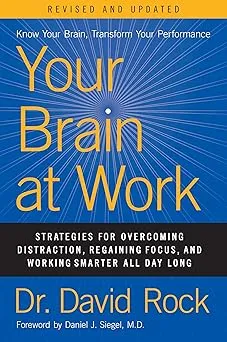About this book
Five Key Takeaways
- Understand your brain's energy limits for better performance.
- Prioritize tasks effectively to enhance mental clarity.
- Minimize distractions to maintain focus and efficiency.
- Manage emotions to improve decision-making under pressure.
- Set realistic expectations to foster motivation and success.
-
The Prefrontal Cortex Has Limits
The prefrontal cortex is central to focus and decision-making, but it's also energy-intensive and easily exhausted by prolonged effort (Chapter 1).
This part of the brain functions best under ideal conditions with minimal distractions, but most modern work environments are full of interruptions.
When the prefrontal cortex is overworked, mental clarity deteriorates, resulting in poor decisions, slower problem-solving, and reduced productivity overall.
Knowing your brain’s limits helps you work with its natural strengths, like tackling deep-focus tasks when mental energy is highest.
Without managing these limits, mental fatigue and cognitive overload can create frustration and hinder progress in complex projects.
As a result of pushing these limits too far, workers can experience burnout, disengagement, and inefficient task management.
Recognizing and respecting these boundaries leads to more effective work patterns, better time management, and improved overall outcomes.
Embracing this knowledge empowers you to harmonize your cognitive efforts, prioritizing smarter rather than harder work.
-
Prioritize Tasks Before Starting Work
Every morning, the brain's mental energy is freshest, making it the ideal time to set priorities for the day (Chapter 2).
Evaluate the importance of tasks and intentionally decide which items deserve focus. Avoid diving straight into emails or minor distractions.
This prioritization process ensures cognitive resources are spent on high-value tasks instead of getting drained by low-priority items.
Clear prioritization helps structure the workday, offering clarity, reducing decision fatigue, and creating a sense of control over time.
Implementing this strategy allows you to work confidently, increasing efficiency and ensuring meaningful progress on your goals.
Without it, you risk wasting energy on less impactful tasks, leading to stress, reduced focus, and missed opportunities for impact.
By forming this habit, you’ll strengthen your ability to manage increasing demands without compromising mental health or performance.
-
Distractions Drain Mental Energy
The brain’s prefrontal cortex, essential for decision-making, is easily exhausted by both external and internal distractions (Chapter 3).
Small interruptions, like notifications, deplete cognitive resources that are already limited, making it harder to stay focused or productive.
Studies show that frequent distractions cause loss of time and diminished performance, creating a snowball effect throughout the day.
Managing external distractions through tools like "do not disturb" settings and internal ones through mindfulness significantly improves mental clarity.
Without these interventions, you risk mental exhaustion, errors, and the frustration of feeling "busy" but not truly productive.
Ultimately, minimizing distractions delivers lasting gains in presence and achievement, enabling you to tackle complex challenges successfully.
-
Emotion Management Is Key to Success
Emotional responses are hardwired for survival, but unmanaged emotions can seriously impair productivity and decision-making (Chapter 4).
Stress, frustration, or anxiety can hijack the brain, depleting cognitive energy and harming focus, memory, and problem-solving ability.
When emotions dominate, even small disruptions feel overwhelming, reinforcing a negative cycle of reduced mental capacity and performance.
However, embracing strategies like labeling emotions and reframing stressful events can reduce their disruptive power and reclaim focus.
Through conscious emotional regulation, people regain cognitive clarity, enabling better decisions and protecting their mental resources.
David Rock argues that learning this skill is essential to navigating modern chaos effectively and avoiding burnout in the long run.
Mastering emotional states also fosters greater resilience, helping individuals thrive even in high-pressure situations and competitive environments.
This fundamental ability to regulate emotions transforms both personal and professional effectiveness, making it cornerstone advice for anyone aiming to excel.
-
Social Connection Shapes Brain Responses
Human brains are hardwired for social connection, treating relationships as fundamental to survival as food and water (Chapter 6).
Positive social interactions enhance performance, while negative encounters trigger emotional resistance and harm collaboration.
Perceiving fairness, recognition, or trust activates rewarding brain systems, fostering motivation and satisfaction at work and in life.
The absence of these positive signals, however, creates a sense of threat, escalating conflict and impairing team performance overall.
Understanding the brain's sensitivity to social cues allows workplaces to build trust, align team efforts, and resolve conflicts effectively.
Addressing social needs proactively reduces bottlenecks and helps reinforce the psychological safety critical for innovation and growth.
Neglecting this reality risks damaging workplace culture, undermining results, and amplifying collective stress and dissatisfaction.
-
Shift Attention to Drive Change
Change is difficult because people focus on threats or problems instead of possibilities, limiting their brain's adaptability (Chapter 8).
To create meaningful change, redirect attention away from mistakes toward desired solutions, fostering growth and collaboration.
When leading, use open-ended questions rather than critiques to guide others toward finding insights and opportunities for themselves.
This approach supports the brain’s neuroplasticity, encouraging individuals to form new mental pathways aligned with their goals.
It creates a constructive atmosphere where people feel empowered to innovate and pursue meaningful transformations.
Ignoring attention redirection risks reinforcing defensive attitudes, stifling creativity, and hindering personal and organizational progress.
Harnessing the power of focused attention unlocks breakthroughs, making this skill invaluable for leaders and individuals alike.
-
Feedback Rarely Drives Real Improvement
Traditional feedback often feels threatening, triggering defensiveness instead of fostering growth or constructive change (Chapter 9).
When status or autonomy feels challenged during feedback, anxiety often blocks the recipient's ability to learn or adapt behaviors.
This misstep can spiral into lingering conflicts, leaving teams frustrated rather than collaboratively solving the root performance issues.
Offering alternative methods, like guided reflection or question-led conversations, shifts ownership of growth back to the individual.
The author contends that leaders should focus less on critique and more on empowering solutions that resonate positively with human psychology.
Reforming how feedback is approached has the potential to create cultures rooted in curiosity, autonomy, and innovation.
Without this shift, workplaces will remain mired in outdated and often counterproductive performance management tactics, missing many opportunities.




















